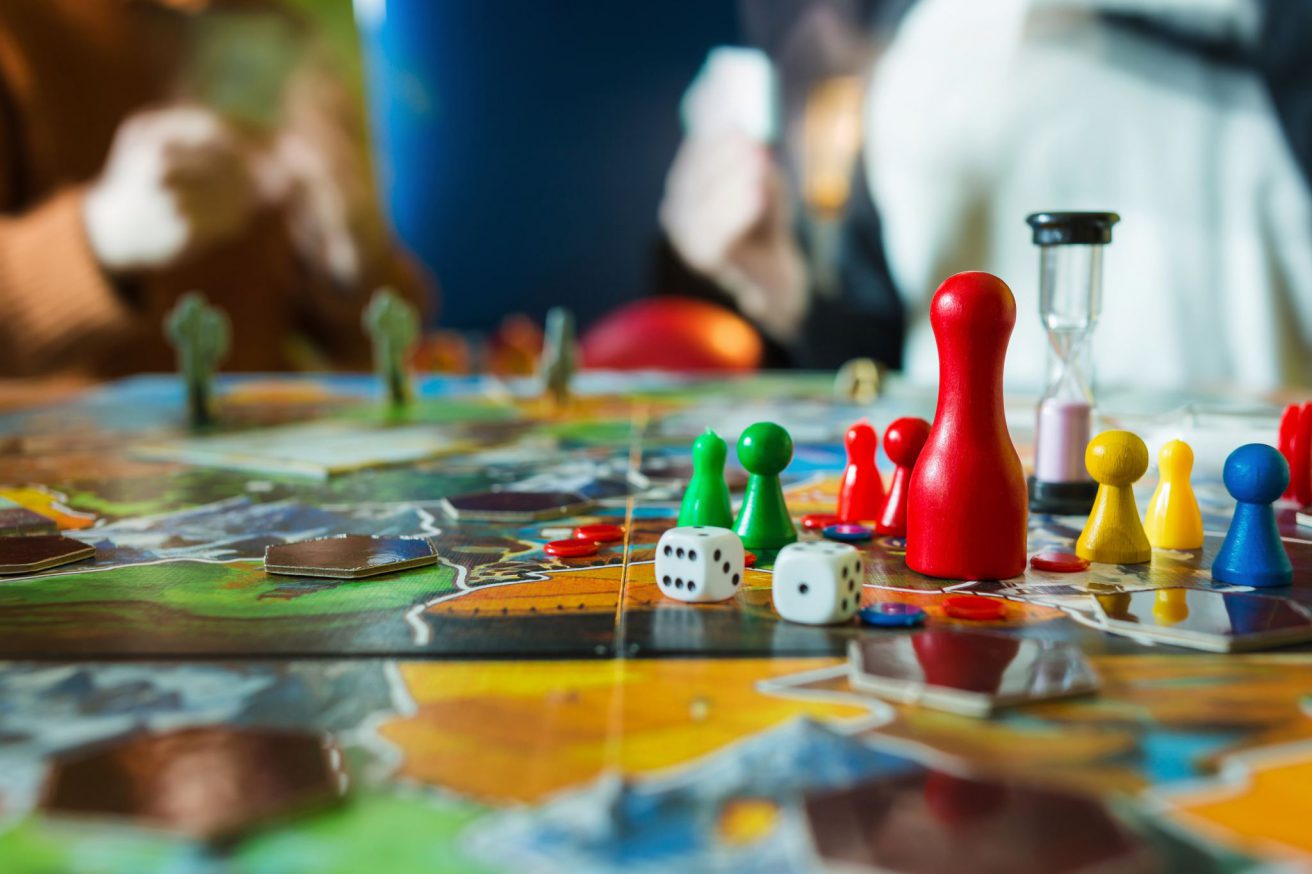4 Ways that Board Games Build Stronger Teams

Because we are currently separated from each other, we have had to press pause on many of our favorite internal ivision events. However, we know that someday in the future we will be back and socializing in person again. There is a lot that we have learned along the way, so today we are sharing insights from one of our most popular events: Board Game Happy Hour.
It’s been well-documented that board games can help develop valuable business skills or make you a more strategic teammate. We asked Kat Chitty, Sales Support Team Lead, to talk about what she has learned from her experiences as the host of ivision’s game nights:
Business lessons from board games
There is a newer genre of board games available: Modern Board Games. They have a variety of mechanics and immersive themes. You no longer have to keep playing Monopoly and Sorry; games like Ticket to Ride, Pandemic and Codenames bring new life to family and friend gaming. Not only that, but these games use elements that are important for business and can be used in any type of career.
Socialization
I first thought about integrating board games into a business setting one year at our company Kickoff. In the evening we have a social happy hour for everyone to enjoy themselves and get to know each other better. At the time, I noticed a few people on the fringes. Not everyone has the social skills to jump in and make small talk, especially if they don’t have a friend to help facilitate.
The next year, I brought games. Anyone was invited, and I pulled in some of those people that I noticed had a harder time socializing. You don’t have to make small talk; you don’t have to know what to say – you just play the game. Getting immersed in the gameplay can help take the edge from the nervousness that social situations bring. It can also help give people talking points for later. Who wouldn’t want to talk about the time you were samurai defending a village?
Lesson 1: For introverted employees, engaging in a game can take the pressure off conversations.
Training
All games have rules. Someone must teach everyone how to play the game. There are thousands of different kinds of games out there and they are all different from each other. Even within a single game, an expansion can change the whole dynamic, causing the teacher to have to adapt and ensure the new rules are understood and followed.
I have found that teaching and running games have helped me with job training. Not only do I absorb more in my own training, but I am also more understanding and open to questions since I am in a teaching role more than just when training a new employee or processes. I have more hands-on training with training itself.
Lesson 2: Build better coaches and trainers by having them lead games.
Strategy and Critical Thinking
Most gamed can seem easy – but they have a deceptive amount of strategy. Players need to be able to look ahead, anticipate other players’ moves, and manage hand sizes and resources. There is a bit of luck, but to really win, a player must be able to think strategically. They need the ability to strategize their turns with what is available to them while considering the other players. For example, other players may buy up the resources you need to implement your plan. You will need to think quickly to come up with another option.
In Sushi Go!, the fast-moving card game, players compete to grab the best combination of sushi dishes. Some players may, for example, avoid shrimp tempura – since you need two of those cards to gain any points. They may assume that it’s easier to pick other cards that give you instant points. However, that means with more tempura cards available, you are free to grab the riskier set and score more points.
On the other hand, if you are following the easy path of everyone else and are now struggling to capture a maki card, you’ll have to think quickly to score the most points. Strategizing with your hand of sushi cards may seem silly, but it builds critical thinking skills. Each game has several of its own strategies, and there are many ways to win.
Lesson 3: The business world is dynamic, and so is gaming. Building problem-solving skills in games can hone strategic thinking at work.
Collaboration
In a competitive game, each player is pitted against each other. With a cooperative game, all players work together to reach a common goal. With so many minds working towards the problem, these games are designed to be more challenging. Each person has a key role to play and the game can only be won by utilizing each person’s skills together. Collaboration is encouraged. Players talk through turns to make decisions about tackling challenges and reach the end goal. Cooperative games encourage team-building skills like trust, communication, and problem-solving.
In Forbidden Island, players attempt to gather treasures and escape from a flooding island before it sinks. Each player uses their unique strengths to help the team successfully escape. There is no way for one player to take over the action and win. Everyone must work together. It teaches you to rely on others and to trust them.
Lesson 4: Collaborative games build trust and communication between teams.
Gaming together, from afar
This is not a comprehensive list, given that each board game is unique and can teach a variety of different things. Even in a remote environment, there are a number of games that can be played virtually, either as phone apps or online:
Those are just a few of the many options for online gaming. Almost any game you play will have some sort of takeaway. And most importantly — they’re a fun way for teams to bond! Games allow coworkers to connect on an emotional level and encourage interactions that would not normally occur at work.



